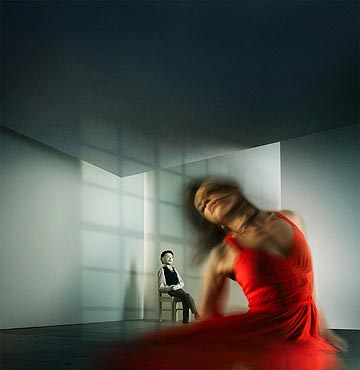 |
|
ARTS |
CULTURE |
|
Mission Newsletter |
|
Joe Goode's dance troupe brought both of these together -- the "graceless" human and the weightless doll -- in Wonderboy at the Joyce Theatre this past weekend in New York. With the aid of puppetmaster Basil Twist, they created a hybrid of theatrical dialogue, campy musical and modern dance, all of which metaphorized the queer condition with masterful subtlety. The cowboy-themed first act features some of the most cinematic dialogues with echoes of David Cronenberg and the fantasy-laden stylistic anarchy of Francois Ozon's Sitcom (1998). While one doesn't expect realism from a modern dance show, Wonderboy seemed to break with its own conceptual logic as it broke into dance (within a dance) and singing. At first this feels confusing and jarring, but the randomness gains strength through a consistence built on its own digressions. Some of the dialogues are repeated twice and one catches oneself wishing they would repeat them once more. "When did you ever find anything about a man by asking him questions?" The songs are melancholy, the accents are full of southern twang, the couples multi-orientational: nothing quite "belongs," which is precisely the point, as the second act features a young puppet miming for his life. The puppet, caged behind a window, imitates human performance with the grace of which von Heist was so in awe: a grace without gravity. The kind of harmony that turns limbs into "pure pendulums." That a dance performance such as this would weave together, ever so subtly, issues of gender identity, performativity and performance, by using a puppet is no coincidence. Von Kleist's seminal article, in fact, used the aesthetic properties of the puppet as a starting point for a much larger metaphysical discussion. One built around the notion that awareness disturbs "natural grace." Which resonates hetero-versus-queer extrapolations. He speaks of an organic kind of movement that would belong to the heterosexual (i.e. oblivious) consciousness. I mime without knowing it's mimicry. To avoid the sin of essentialism we can speak of an organic-esque performance of heterosexuality, completely unaware of the ideology it beholds, spews and obeys like another kind of doll, Wonderboy's less fortunate cousin: automata. The queer condition would, then, so tragically conscious of its bodily and existential problematics, suffer from this awareness that spoils "grace." A victim of mimicry, as if marred by its failure to mime gender "organically," undoubtedly. In a reverse-Medusa effect, queers go un-blinded and unstable by realization. Ironically, the not-so-perfectly sutured ones bear the secret (and the evidence) of the obliviously happy mass: it is all theater. Luckily, von Kleist believes that after this grace-shattering consciousness triggered by the search (intentional or not) for truth through knowledge, there comes a return to innocence, which would make the "aware ones" capable of being graceful again. "But that's the final chapter in the history of the world," he says. |
(c)2008 - 2016 All contents copyrighted by AcousticLevitation.org. All contributors maintain individual copyrights for their works.
 Strings
Attached:
Strings
Attached: